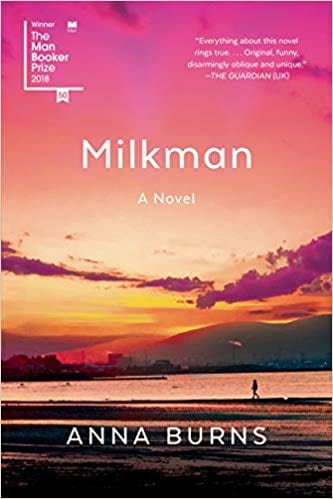Anna Burns’s 2018 Booker Prize-winning novel Milkman is a unique account of one girl’s experience with sexual menace in a hyper specific time and location. The narrator is a teenage girl in 1970’s Northern Ireland, when the country was torn by the Troubles, a nationalist conflict that brought division and violence to the region for decades. The unnamed Irish city (possibly Belfast) and its community is revealed through her. The city is divided into sides, with paramilitaries controlling and threatening both sides based on “the right religion” or “the wrong religion,” but the issues of the conflict itself are alluded to rather than explained (check out our reference sources for that!). Community members are divided and categorized based on their rightness or wrongness related to religion, and further categorized based on their ability to (or lack thereof) to amalgamate, to weave themselves without notice into the fabric of daily town life, or be deemed “beyond-the-pales” and socially isolated.
Our narrator, unnamed, is a daughter and sister, a maybe-girlfriend to a young mechanic, a runner, and a reader of pre-20th century literature. She is known for long-distance solo runs and for reading while walking. Her reading while walking is an issue for the community, because it isn’t possible to melt seamlessly into the fabric of the community while reading rather than, say, looking at your surroundings. She is desired by, and targeted by, a local paramilitary bruiser known as the Milkman, who finds ways to isolate her and threaten her well-being, leading her to be increasingly paranoid and anxious. This story, as relevant today in our contemporary #metoo moment, was explored with a depth not often seen in literature describing sexual assault and menace. I was most compelled at the infrequent but utterly fraught encounters between our narrator and the Milkman.
I know next to nothing about this particular conflict and found the world-building to be fascinating, and the narrator’s voice completely unique. The issue I had with this novel was the dizzying prose that Burns builds into towering paragraphs that go for pages. Any facet of the community could be a topic for lengthy diversions from the main thread. For example, passages detailing the creation and history of a small outsider sect of feminists, the unusual media literacy of the narrator’s many sisters, and the sublime realization that sunsets contain many colors, typically invisible to the community’s myopic eye. Burns loves constructions of threes, much like the previous sentence of this review, a tactic that feels fresh at first, then increasingly meandering and stale.
The community itself is examined for its levels of outsiderness, each member having no real name (naming conventions are also thoroughly critiqued) but for having an illness, a death, an occupation, something to separate them and name them. Some of the nicknames: maybe-boyfriend, tablets girl, Somebody McSomebody, real milkman. (For more about the naming and the not-naming, see this review at NPR.) The divergence from the central thread of the story to include many overlapping and interwoven stories felt burdensome at times. However, it was a richly-realized portrayal of the communal anxiety of life during wartime, where boundaries and hierarchies are created among people to make the inflicted boundaries of “peace-walls” more bearable.
The voice of the narrator is specific, rich, unique to her sense of self and her community. But it also, often, felt like a vehicle for oblique references I didn’t understand. At times, I wondered if the narrator was really the voice I was reading, or if it had somehow merged, chorus-like, with the community’s. The stream of consciousness was self-conscious, and didn’t always feel like a teenage girl, even one who read 19th century novels. I can’t help but draw similarities to the stream-of-consciousness of a Virginia Woolf character, which so often switches and subsumes another voice, or group of voices. I felt very aware of the writing, and the machinations of the author (the names, the digressions, the things said in threes), and never once sank into the narrative voice of the girl. That said, the book is intellectually challenging and colorful. I do recommend it, especially if you have an interest in Ireland, the Northern Irish conflict, the life experience of teenage girls during wartime, or sunsets.


